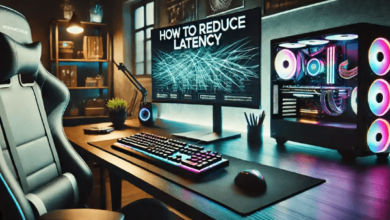Building Strong Online Game Communities: From Casual to Competitive

The rise of online gaming has transformed the gaming landscape, creating vast, dynamic communities that transcend borders and cultures. Whether you’re a casual gamer or a competitive esports enthusiast, online game communities play a pivotal role in shaping your experience, from the friendships you form to the strategies you develop. Building a strong, healthy online gaming community is essential for maintaining player engagement, fostering long-term success, and ensuring a positive environment for all.
While the term “community” might evoke images of casual players having fun together, the scope is much broader, ranging from casual groups to hardcore competitive clans and esports organizations. Each has its own set of challenges and rewards, and understanding how to cultivate an inclusive, positive, and competitive environment is key to growing and sustaining a thriving gaming community.
In this article, we’ll explore how to build a strong online gaming community, from the foundations of creating a welcoming space for casual players to nurturing a competitive ecosystem that attracts the best talents.
1. Introduction: The Importance of Online Game Communities
What Makes a Successful Online Game Community?
A successful online game community is one that fosters inclusivity, engagement, and positive interactions among its members. It provides a space where players can connect, share experiences, and collaborate, whether they’re casually enjoying a game or competing at the highest levels. A thriving community offers players more than just gameplay; it offers a sense of belonging.
See also: 23azo
The Role of Communities in Modern Gaming
Online game communities are now central to the modern gaming experience. They create a bridge between players, transforming a solitary activity into a social experience. These communities provide a sense of purpose, competition, and camaraderie that extends beyond the game itself.
2. Building the Foundation: Creating a Welcoming Environment
How to Attract New Players
Attracting new players to your community begins with creating a welcoming atmosphere. Make sure that new players feel valued from the moment they enter the community. Offering beginner guides, clear communication about the game’s mechanics, and having supportive community members go a long way in reducing the intimidation factor for newcomers.
Setting the Tone: Friendly vs. Toxic Communities
A welcoming tone can significantly impact the health of your community. Encourage positive interactions, sportsmanship, and inclusivity, and make sure to quickly address toxic behavior. Establishing a strong code of conduct and clear community guidelines is critical in ensuring that players know what is acceptable.
3. Community Engagement: Keeping Players Active and Involved
Rewarding Player Contributions
A strong community thrives when players are actively contributing. Offering incentives like badges, ranks, or other rewards for community participation can keep players engaged. Recognizing players for their contributions, whether through creating content, helping others, or participating in events, fosters a sense of ownership and pride in the community.
Organizing Events and Tournaments
One of the best ways to keep players engaged is by organizing in-game events, tournaments, or challenges. These events not only bring players together but also create an ongoing reason for them to log in and participate. Casual players enjoy the chance to play for fun, while competitive players can hone their skills in a structured environment.
4. The Role of Moderation in Community Management
Maintaining a Safe and Respectful Environment
Moderation is essential in any online community. Ensure that your community has a team of dedicated moderators who can enforce community rules and resolve conflicts quickly. A safe and respectful environment encourages players to return and participate without fear of harassment or discrimination.
Handling Conflict and Disputes
Conflicts are inevitable in any large community. Effective community management involves resolving disputes fairly and transparently. Providing players with a way to report problems and ensuring that your moderation team acts swiftly and justly is crucial to maintaining the integrity of the community.
5. From Casual to Competitive: Nurturing Different Types of Players
Encouraging Casual Play and Social Interaction
Casual players are the lifeblood of many online communities. These players enjoy games for fun and social interaction rather than competition. Encouraging casual play through relaxed events and social activities (like in-game chat, non-competitive missions, or social lounges) can help players feel involved without the pressure to perform.
Transitioning to Competitive Gameplay
For those who want more, offering a pathway to competitive gaming is key. Providing resources like guides, practice matches, and the opportunity to join teams or clans can help players transition from casual play to more serious competitive environments. Competitive communities thrive when players feel they can improve and take their skills to the next level.
6. Fostering a Positive Competitive Culture
Building Competitive Teams and Clans
A competitive gaming community depends on the creation of well-structured teams and clans. Teams provide a platform for players to develop tactical skills, communicate effectively, and grow together. Encouraging teamwork and collaboration within these groups helps build a strong competitive culture, where players support each other’s growth.
Ensuring Fair Play and Integrity in Competitions
A competitive community must prioritize fair play. Ensuring that all players have equal opportunities for success and that no one is able to cheat or exploit the system is fundamental for maintaining a positive competitive atmosphere. Enforcing fair play not only helps maintain the integrity of the game but also promotes respect among players.
7. The Power of Communication: Tools for Connecting Players
Discord and Other Communication Platforms
Effective communication is essential for building strong communities. Platforms like Discord have become synonymous with gaming communities, offering voice chat, text channels, and private group features. Discord enables players to engage with one another, share strategies, and bond over shared interests.
Encouraging Communication During Gameplay
Effective communication is especially important in competitive games. Encourage players to use voice communication or in-game chat to strategize, make real-time decisions, and build team cohesion. Establishing clear communication norms and providing tools to facilitate conversations can improve the overall player experience.
8. Incorporating Feedback: Listening to Your Community
Importance of Player Feedback in Community Growth
To build a lasting community, you need to listen to the players. Incorporating feedback, whether through surveys, open forums, or direct communication, helps developers and community managers understand the needs and desires of their players. It also gives players a sense of ownership in the community, as their opinions are valued.
Acting on Feedback to Improve the Experience
Once feedback is collected, it’s crucial to act on it. Whether it’s tweaking game mechanics, improving community events, or addressing concerns about game balance, responding to feedback shows that the community’s voice is heard and respected.
9. Leveraging Social Media to Build Community
Engaging with Players Beyond the Game
While in-game interactions are important, connecting with players outside of the game is also essential for building a strong community. Social media platforms like Twitter, Reddit, and Instagram offer great opportunities to engage players, share news, and celebrate community achievements.
Using Platforms like Twitter, Reddit, and YouTube
Use these platforms to promote community events, share memes, or host Q&A sessions with developers. Engaging with the community on social media fosters a sense of belonging, encourages more interactions, and helps to keep players engaged even when they’re not playing the game.
10. The Business Side of Community Building
How Game Developers Can Support Communities
Game developers play a key role in supporting and growing online communities. They can provide tools like in-game moderation features, community events, and player support systems to enhance the community experience. Developers can also foster community growth through sponsorships, collaborations, and by offering exclusive content.
Partnerships and Sponsorships in Competitive Communities
For competitive communities, sponsorships from brands or partnerships with esports organizations can significantly boost visibility and growth. These partnerships not only bring in financial support but also elevate the reputation of a community, attracting both players and spectators alike.
11. The Challenges of Building Online Communities
Addressing Toxicity and Burnout
Toxic behavior and community burnout are significant challenges. To combat this, communities need strong moderation, as well as measures to prevent player burnout, such as offering breaks, balancing in-game challenges, and ensuring fair reward systems.
Maintaining Long-term Engagement
Keeping players engaged over time requires innovation. Regular content updates, events, and continual community-building efforts are essential to maintain interest. Without these, players may lose interest or migrate to other games.
12. Case Studies: Successful Online Game Communities
Fortnite and Its Battle Royale Community
Fortnite offers an example of how a game can create a strong, engaging community. Its free-to-play model, frequent updates, and inclusive events have made it a global phenomenon.
League of Legends: From Casual to Competitive
League of Legends has grown from a niche game to one of the biggest esports in the world. Its focus on community-building, competitive play, and esports tournaments have made it a model for success.
13. The Role of Esports in Building Stronger Communities
How Esports Creates Unity Among Players
Esports organizations bring players together with common goals and competitive aspirations. These organizations create robust support systems, fostering loyalty among players and fans.
The Impact of Professional Leagues on Casual Players
Professional leagues like Overwatch League or LCS can increase the game’s visibility, making it more exciting for casual players to become involved in the competitive aspect of the game.
14. The Future of Online Game Communities
Trends Shaping the Future of Gaming Communities
The rise of VR, social games, and new communication platforms is shaping the future of online gaming communities. Virtual worlds and augmented reality could lead to even more immersive and interactive community experiences.
What the Next Generation of Online Communities Will Look Like
As gaming becomes more accessible and diversified, online communities will become more inclusive, diverse, and interconnected. The future will likely bring a combination of global multiplayer experiences and niche communities that cater to different tastes and interests.
15. Conclusion: Building a Lasting Legacy in Online Gaming
Building strong online game communities is not a one-time effort; it’s an ongoing process. It requires dedication, listening, and adaptability to keep up with the ever-changing gaming landscape. Whether you’re fostering a casual gaming hub or an elite esports team, the principles of respect, engagement, and collaboration will always be the foundation for success. By building a positive, inclusive environment, game developers and community managers can create lasting, vibrant communities that stand the test of time.
Frequently Asked Questions (FAQs)
How do I start building an online game community?
Start by creating a welcoming environment, offering resources for new players, and encouraging positive interaction. Regular events and a clear code of conduct will help maintain a healthy community.
What are the benefits of having a strong gaming community?
A strong community provides social interaction, player support, feedback opportunities, and a sense of belonging, all of which enhance the overall gaming experience.
How can I transition my casual community into a competitive one?
Introduce structured gameplay, create tournaments, offer competitive rewards, and provide guidance on improving skills to help players transition into competitive gaming.
How do I deal with toxicity in my community?
Establish clear rules, enforce moderation, and offer support for players who experience harassment. Encouraging positive behavior and penalizing toxic actions will help maintain a safe space for everyone.
What role does social media play in building a gaming community?
Social media helps connect players beyond the game, offering a platform for discussions, event promotion, and fan engagement. It expands the community and keeps players involved outside the game.
How do professional esports affect online game communities?
Esports organizations help raise the profile of a game, providing opportunities for casual players to aspire to professional levels, which fosters a deeper connection to the game and its community.




